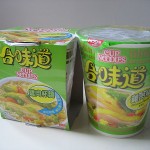Japanese food to be checked for radiation by health authorities
Japanese food including noodles, seafood, snacks and other processed products will be monitored for abnormal radiation levels, the U.S. Food and Drug Administration said in a statement.
The agency said it is considering measures that "may include increased and targeted product sampling" of imported Japanese food because of the nuclear crisis in Japan.
"FDA will be examining both food products labeled as having originated in Japan or having passed through Japan in transit," the statement said. "The same is true for raw ingredients."
Health authorities around the world have expressed concern over radiation exposure of agricultural products in Japan after the Fukushima Dai-Ichi nuclear power plant emitted high radiation and is now in danger of a meltdown.
The U.N. Food and Agriculture Organization said today that food products in the danger zone near the nuclear plant may be contaminated.
Japanese food accounts for roughly four percent of all U.S. food imports. The FDA said food items from Japan in U.S. supermarkets and retailers are considered safe from radiation since they were imported before the earthquake and tsunami, which damage the nuclear reactors, struck Japan.
The FDA also said exports from Japan have been "severely limited" because of the damage inflicted by the disasters. It also said seafood are unlikely to be contaminated since the ocean will dilute the radiation.
Neigboring countries in the Pacific Rim including South Korea, Singapore and Indonesia have said they are currently conducting their own tests of Japanese food imports.
Besides radiation exposure, the multiple disasters that hit Japan have impaired food refrigeration units and created unsanitary conditions, which can potentially damage or contaminate Japanese food.
